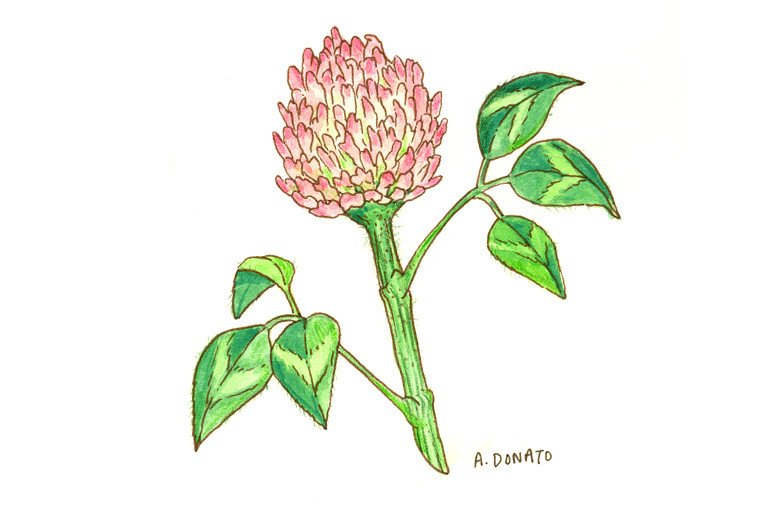
Common Names
- Cow clover
- Wild clover
- Purple clover beebread
- Cow grass
- Meadow clover
- Purple clover
For Patients & Caregivers
Tell your healthcare providers about any dietary supplements you’re taking, such as herbs, vitamins, minerals, and natural or home remedies. This will help them manage your care and keep you safe.
Red clover is an herb that belongs to the same family as peas and beans. It contains nutrients known as isoflavones (i-so-FLAY-vones) that help treat hot flashes.
Red clover is used in traditional medicine for many health issues. You can take red clover supplements as tablets, capsules, and tinctures (concentrated herbal liquid). It also comes as creams and ointments that you can put on your skin.
Red clover is used to:
- Manage symptoms caused by menopause (permanent end of menstrual cycles), such as hot flashes.
- Treat osteoporosis (thinning of your bones).
- Lower high cholesterol.
Red clover also has other uses that have not been studied by doctors to see if they work.
Talk with your healthcare provider before taking red clover supplements. Herbal supplements are stronger than the herbs you would use in cooking.
Some supplements can also affect how medications work. For more information, read the “What else do I need to know?” section below.
Side effects have not been reported.
- Talk with your healthcare provider if you’re taking blood thinners such as warfarin (Jantoven® or Coumadin®). Red clover may increase your risk of bleeding.
- Avoid red clover if you’re pregnant or breastfeeding. It may not be safe for you.
- Talk to your healthcare provider if you have a hormone-sensitive cancer (like some breast cancers). Red clover may worsen your condition.
- The safety of using red clover over a long period of time is not known.
For Healthcare Professionals
Red clover is a perennial herb traditionally used to treat skin disorders such as psoriasis and eczema, whooping cough, and mastitis. It contains compounds known as isoflavones that act as phytoestrogens. An isoflavone extract is widely promoted as a dietary supplement to relieve menopausal symptoms.
Preclinical studies suggest red clover extract may act as an estrogen agonist and stimulate proliferation of ER-positive breast cancer cells (1). However, the isoflavone Biochinin A inhibited aromatase activity and expression (2) and may therefore confer a protective effect. Isoflavone-enriched extracts have shown neuroprotective effects in human cortical neurons (3) (4) and reduced skin aging in mice by increasing collagen (5).
Clinical data show that supplementation with red clover isoflavones improves menopausal symptoms compared with placebo (7) (8), but systematic reviews are mixed (9) (24) (10). In postmenopausal women, supplementation alleviated vasomotor and menopausal symptoms (18) (25). A meta-analysis of a standardized extract suggests potential reductions in total cholesterol in peri- and postmenopausal women, but studies were heterogeneous (29). Isoflavones may also improve bone loss (11). In a trial involving osteopenic postmenopausal women, a red clover extract rich in isoflavones, aglycones, and probiotics attenuated bone mineral density loss caused by estrogen deficiency and improved bone turnover (26).
Of concern are findings that red clover inhibits the growth of normal prostate cells and increases resistance of prostate cancer cells to high-dose radiation in vitro (15). Patients should consult with their physicians before taking red clover supplements.
- Menopause support
- Osteoporosis
- High cholesterol
Formononetin, an isoflavone, induced apoptosis in human breast cancer cells by activating the Ras-p38 mitogen-activated protein kinase in ER-positive breast cancer cells (23). It also inhibited proliferation of human osteosarcoma U2SO cells by decreasing expression of miR-375 and Bcl-2, an apoptotic repressor, while increasing Bax, a pro-apoptotic protein (27). The isoflavone Biochanin A inhibited activity and gene expression of aromatase, an enzyme that catalyzes the conversion of androgen to estrogen (2). In addition, it protected dopaminergic neurons against lipopolysaccharide-induced damage by inhibiting microglial activation and proinflammatory factors (3). An isoflavone-enriched fraction showed neuroprotective activity in human cortical neurons as well, possibly due to antioxidant and estrogenic effects (4).
In a murine model, red clover isoflavones reduced skin aging induced by estrogen deprivation following ovariectomy (5).
- Patients with hormone-sensitive cancers should avoid red clover because it has estrogenic activity (21).
- Red clover may increase effects of anticoagulants and antiplatelet drugs (20).
- Red clover was associated with toxic effects when used by a patient receiving methotrexate injections for severe psoriasis (19).
Case reports
Subdural hematoma: In a 65-year-old woman with no other risk factors for bleeding except long-term use of red clover supplements for postmenopausal symptoms (6).
Subarachnoid hemorrhage: In a 53-year-old woman following use of an herbal supplement containing red clover, dong quai, and Siberian ginseng for perimenopausal hot flashes. Symptoms resolved after supplement discontinuation (16).
Anticoagulants / Antiplatelets: Preclinical studies suggest red clover may increase their effects (20). Clinical relevance has yet to be determined.
CYP450 enzymes: Preclinical studies suggest red clover can inhibit 1A2, 2C8, 2C9, 2C19, 2D6, and 3A4, and may interact with substances metabolized by these enzymes (17) (28). Clinical relevance has yet to be determined.
Methotrexate: Red clover was reported to cause toxicity, resulting in severe vomiting and epigastric pain, when used along with methotrexate injections (19).